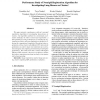Free Online Productivity Tools
i2Speak
i2Symbol
i2OCR
iTex2Img
iWeb2Print
iWeb2Shot
i2Type
iPdf2Split
iPdf2Merge
i2Bopomofo
i2Arabic
i2Style
i2Image
i2PDF
iLatex2Rtf
Sci2ools
100
click to vote
PDCAT
2005
Springer
2005
Springer
Performance Study of Nonrigid Registration Algorithm for Investigating Lung Disease on Clusters
This paper presents a performance study of a nonrigid registration algorithm for investigating lung disease on clusters. Our algorithm combines two conventional acceleration techniques in order to achieve fast registration: a data-parallel processing technique for accelerating the registration procedure; and a precomputation technique for reducing the computational complexity. We perform some experiments on three clusters with different CPU and network performance in order to make clear what kinds of acceleration techniques and computing environments provide higher performance. The results show that a cluster with Gigabit Ethernet (GbE) network is the most cost effective solution that reduces registration time from ten hours to ten minutes with a linear speedup.
Acceleration Techniques | Conventional Acceleration Techniques | Distributed And Parallel Computing | Nonrigid Registration Algorithm | PDCAT 2005 |
Related Content
| Added | 28 Jun 2010 |
| Updated | 28 Jun 2010 |
| Type | Conference |
| Year | 2005 |
| Where | PDCAT |
| Authors | Fumihiko Ino, Yuya Tanaka, Kenichi Hagihara, Hiroko Kitaoka |
Comments (0)

